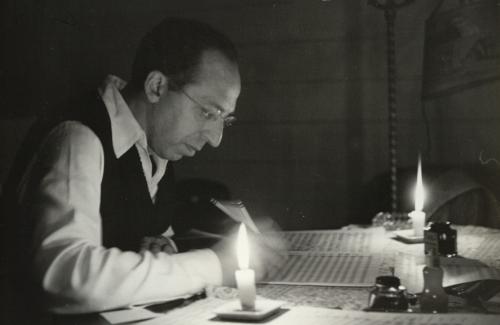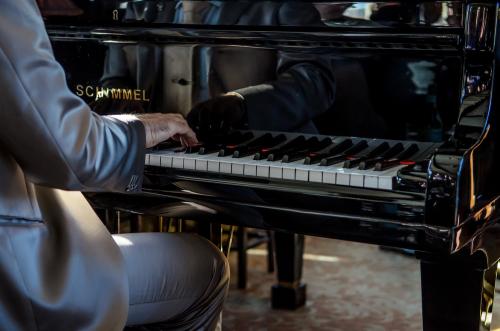Eligibility FAQs
What is the Fund's definition of "contemporary music?"
For the Fund’s purposes, music composed within the last 40 years is considered contemporary. For jazz submissions, only original works or substantially original, non-derivative arrangements composed within the last 40 years are considered contemporary.
What is the Fund's definition of "American music?"
Music by composers with U.S. citizenship, wherever they may live, as well as non-citizen composers who have lived and worked in the U.S. and its territories for a significant period.
What is the Fund's definition of "concert music?"
For the Fund’s purposes, concert music includes opera, orchestral and chamber music for instrumental and/or vocal ensembles, as well as experimental genres and similar formats.
Does the Fund support jazz?
Yes, the Fund supports contemporary American jazz. For jazz submissions, the music must contain improvisation and only original works or substantially original, non-derivative arrangements composed within the last 40 years are considered contemporary.
Will the Copland Fund consider funding for holiday or pops concerts?
Holiday and pops programming is not eligible for support, however, such programming will not have an adverse effect on your application if there is sufficient eligible contemporary concert music activity throughout your season.
Does the Fund support musical theater?
No, Broadway-style musical theater projects are generally not supported. Opera and dance projects involving live performances of contemporary concert music are supported.
Our organization does not have non-profit status. Can we apply?
Yes, provided you obtain fiscal sponsorship from a non-profit organization with 501(c)(3) status. Be sure to review program guidelines and application instructions to submit proper documentation.
Can I apply to the Fund as an individual?
No, individuals are not eligible to apply for support through the Fund’s programs, with or without a fiscal sponsor. Individual artists are encouraged to work with the organization(s) involved with their project which may be eligible to submit an application for support for that project.
Individuals may find other grant opportunities on Candid.
Does the Fund make grants for retroactive support?
The General Support and Project Support Programs provide funding for activity that occurs between September of the current year through August of the next year. The timing of the activity in relation to application deadlines or award announcements is not considered so long as it takes place during the stated support year window.
Does the Fund give grants to arts organizations outside New York City?
Yes! Non-profit and fiscally sponsored organizations with eligible activity throughout the United States and internationally are welcome to apply for support. For examples of the Fund's geographic breadth of support, please see our past grants page.
Does the Fund provide funding for educational institutions or initiatives?
Activities involving school-age students, student ensembles, or credit-bearing university activities are not eligible for support through any of the Fund's programs. Educational institutions may apply for support as presenters for activities such as faculty recital series and concert presentations featuring professional musicians.
Youth choruses that perform contemporary concert music specifically composed for children’s voices may be considered. Please contact our Grants Team for more information.
Organizations may also apply for support for professional development and training activities that meet all other eligibility criteria.
How does the Fund define professional development?
For the purposes of our grant programs, professional development activity is a program or initiative for young, emerging, or other professional musicians, including composers. These types of activities may include mentorship or training, performance opportunities, or other activities that benefit the professional attendee(s) in gaining experience or otherwise building their career(s).
Please note that the Fund does not provide support for individuals or members of an organization to attend professional development programs or activities.
Does the Fund provide funding for community, volunteer, or amateur ensembles?
Due to the competitive nature of the Fund’s grant programs, community, volunteer, and amateur ensembles are generally not competitive for support. For specific inquiries, please contact our Grants Team.
Can I apply to the Fund for a commission, or as part of a consortium project?
The Fund does not provide grants for commissioning fees. In the case of consortium projects, contact our Grants Team with your specific details.
May I apply to more than one grant program?
No. Organizations may apply to either the General Support Program or the Project Support Program, but not both in the same year. Applicants are not required to apply to the same program every year, but may only apply to one program per year.
Should I apply to the General Support or Project Support Program?
If your organization has a history of substantial commitment to contemporary American concert music or jazz and plans to continue that commitment, we recommend applying for support through the General Support Program.
If your organization does not typically engage in substantial activity involving or supporting contemporary American music but has an upcoming program or project featuring eligible activity, we recommend applying for support through the Project Support Program.
I missed the preliminary round deadline. Can I still apply?
No, not for the current grant cycle. All applicants wishing to apply for support through the General Support or Project Support Programs must first submit an application to the corresponding preliminary round. Applications for each program’s main round will only be accepted from organizations that have submitted a preliminary application and have been invited to apply to the main round. No other applications will be considered.








